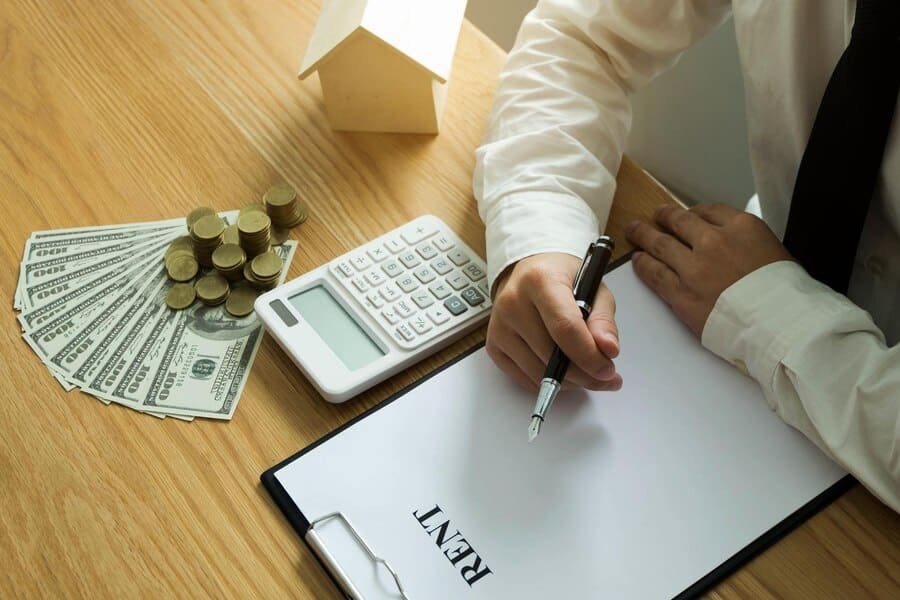What You Need To Know About Unsecured Personal Loans
Unsecured personal loans are great for getting money without needing to offer something as security. This type of loan looks at how good you are with money. It checks your credit score, your income, and how much you still owe. Other loans, like home or car loans, ask you to put something valuable at risk. But, with unsecured personal loans, you don’t have to worry about that. This makes them an easier option for a lot of people.
If you want to fix your debt, make your home better, or handle surprise costs, these loans could be right for you. It’s good to know all about them before you decide. We will look at how much you can get, what you’ll pay back, and how it affects your credit score.
Key Takeaways
- Unsecured personal loans look at how reliable you are, not your things.
- You can borrow from $1,000 to $100,000, but costs and payback times differ between lenders.
- You can use these loans to handle different tasks, like fixing your debt, making your home nicer, or dealing with surprises.
- To get a loan, you need to have a decent credit score, and earn enough money without having too much debt.
- Checking offers from online lenders, banks, and credit unions lets you find the best deals and conditions.
Understanding Unsecured Personal Loans
Unsecured personal loans are a way to borrow money without offering something like a house or car as a backup. Instead, your credit history, income, and outstanding debts are checked by the lenders. This helps them decide if you qualify and on what terms. You can use these loans for many things, like debt consolidation, home improvements, or handling unexpected expenses.
Definition and Key Features
This kind of loan doesn’t need you to provide collateral, which means no risk to your assets. What matters most is your credit score, financial history, and if you can pay back the loan. It’s also known as a signature loan because your word (signature) shows you’ll pay it back. Or it’s called a personal installment loan, too.
Unsecured vs. Secured Loans
With secured loans, you must use something big, like a house, for the lender to take if you can’t pay. Think mortgages or auto loans. But unsecured personal loans are different. You don’t need to risk what you own. This makes it easier for people without much or with poor credit history to borrow.
However, borrowing with no collateral can bring challenges. You might get a higher interest rate. The rules you must meet could be tougher. This is because the lender has more risk without your pledge.
How Unsecured Personal Loans Work
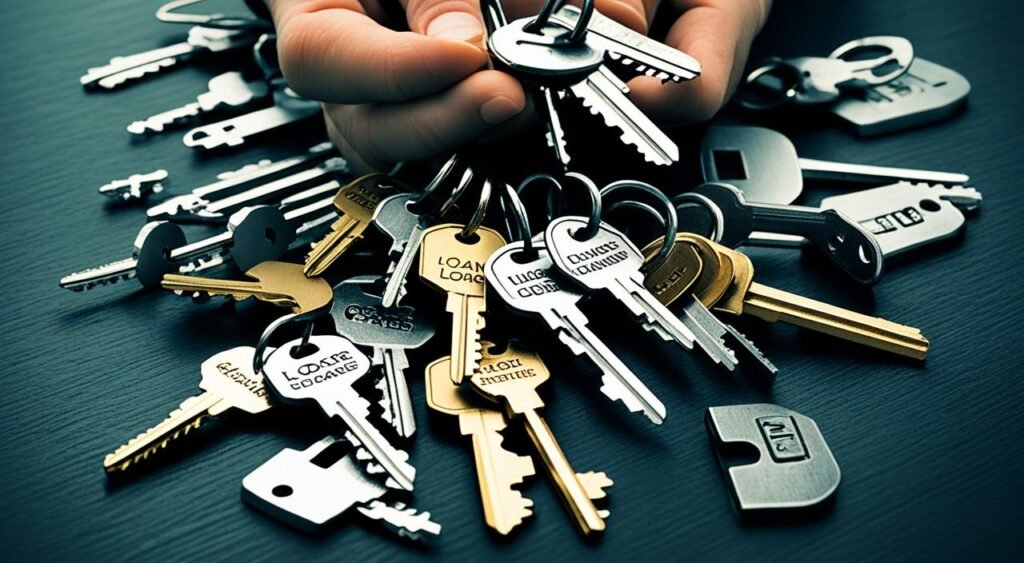
Unsecured personal loans give you a sum of money, like $1,000 to $100,000. You pay this back monthly with interest. The interest rate is usually higher than secured loans. This is because there’s no need for you to give something valuable as a backup against the money.
Loan Amounts and Interest Rates
With unsecured personal loans, you can borrow from $1,000 up to $100,000. How much you get depends on your money record and financial situation. The rate of interest relies on your credit score, how much you earn, debts you have, and the details of your loan. The annual percentage rate (APR) might vary from 6% to 36%.
Repayment Terms and Monthly Payments
Repayment terms for these loans are between one and seven years. You pay a fixed amount each month. Choosing a longer time to pay means smaller monthly bills. But, this also means you pay more interest in total.
Impact on Credit Score
When you ask for this loan, the bank looks closely at your credit history. This is called a hard credit check. Sometimes, this check can drop your credit score a little. But, paying off the loan on time proves you are good with debts. This can make your credit score better over the years.
Common Uses for Unsecured Personal Loans
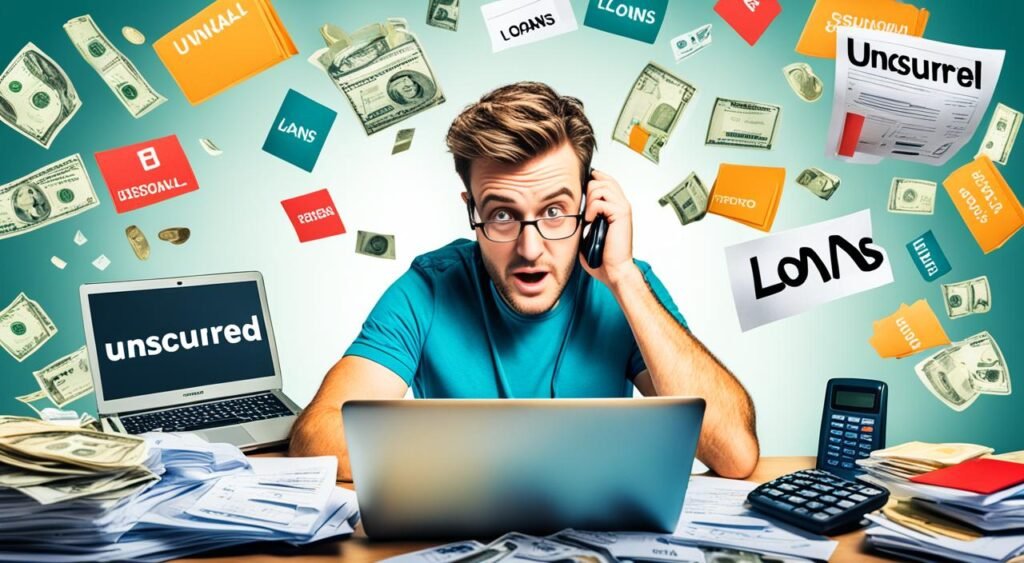
Unsecured personal loans can be used for many different needs and goals. They give borrowers flexibility. Lenders often suggest specific uses, but the money can be used for almost anything.
Debt Consolidation
A key reason people get an unsecured personal loan is to consolidate debt. This means using the loan to pay off high-interest debts like credit cards. By doing this, they turn many payments into one, hopefully smaller payment. It makes keeping track of money easier, cuts interest costs, and speeds up becoming debt-free.
Home Improvements and Renovations
Looking to upgrade your home? Unsecured personal loans can be great for this. You can finance projects like a new kitchen or bathroom, an extra room, or energy-saving updates. The good thing is you don’t risk your home as you would with a home equity loan.
Unexpected Expenses and Emergencies
Life brings surprises, like medical bills or a broken car. An unsecured personal loan can help cover these sudden costs. It’s a quick way to get money without draining your savings or going into big credit card debt.
These loans are also handy for weddings, holidays, and other lifestyle expenses. They can even help you reach personal financial targets.
Qualifying for an Unsecured Personal Loan
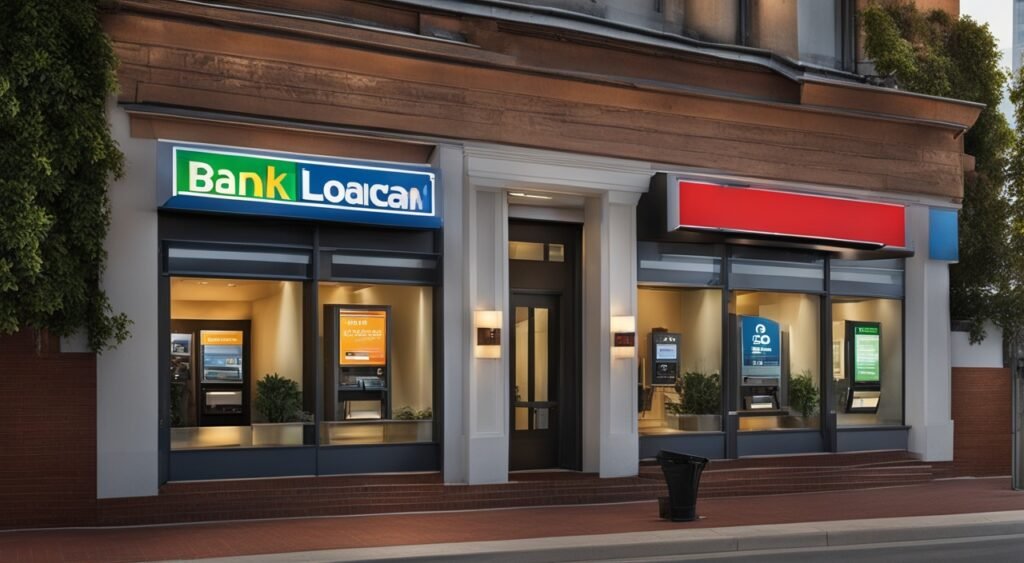
When you want an unsecured personal loan, lenders will check several things. These are your credit score, income and debt-to-income ratio (DTI), and details about your job and how much you earn.
Credit Score Requirements
Your credit score matters a lot to lenders for an unsecured personal loan. If you have a good credit score (usually 650 or more), you’ll get lower interest rates and better loan terms. They look for a solid credit history to see if you handle debts well.
Income and Debt-to-Income Ratio
Lenders focus on your income and debt-to-income ratio (DTI) too. They do this to see if you can pay monthly loan payments. Having a low DTI and more income than debt is good. It helps you get better interest rates and repayment terms on an unsecured personal loan.
Employment and Income Verification
Lenders may ask for proofs like payslips, tax info, or bank records. This is to check your job and income are stable. Showing you have a steady job and income means you can likely pay back the unsecured personal loan.
Knowing these important points can improve your chances. It helps you get an unsecured personal loan that suits your financial wants and goals.
Unsecured Personal Loans
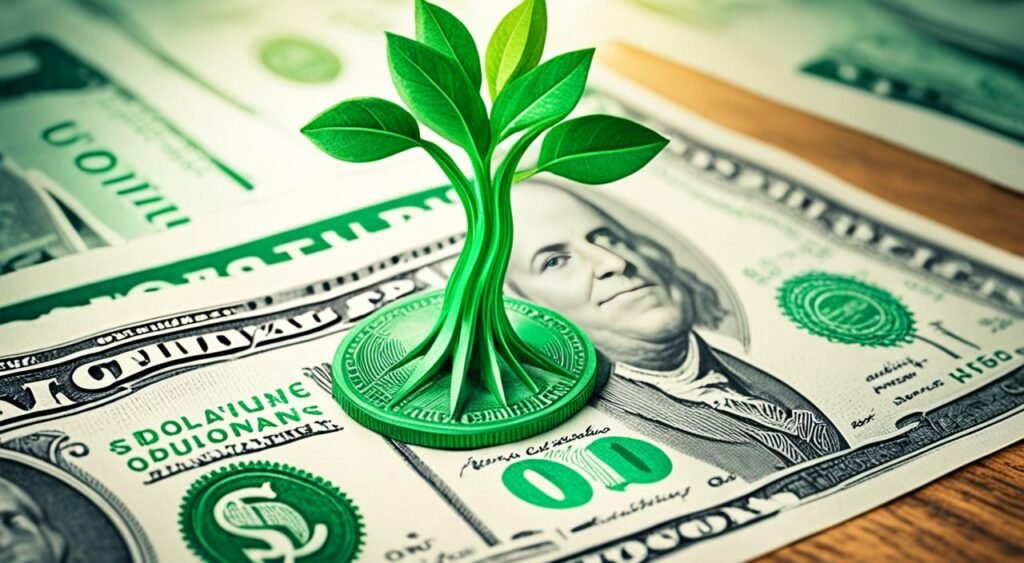
Unsecured personal loans are a great way to borrow money without needing to provide anything for security. They look at things like your credit history, income, and debt-to-income ratio (DTI) rather than needing a big item as a guarantee. You can use these loans for many things, like debt consolidation, home improvements, and dealing with unexpected costs.
These loans usually go from $1,000 to $100,000 and you pay them back over 12 to 84 months. The interest rates you get depend on your credit profile. They can be low, like in the single digits, but might go up if your credit is not that good.
To get an unsecured personal loan, you need to meet some requirements. This includes having a certain credit score, a steady income, and not too much debt compared to your income. The lender will also check your credit and make sure you have a job and enough income to pay them back.
One big plus of unsecured personal loans is not having to risk your home or car. This makes them a choice for those without big assets to offer. But because there’s no collateral, the interest rates on these loans can be higher than on loans you secure with something.
| Key Features of Unsecured Personal Loans | Details |
|---|---|
| Loan Amount | $1,000 to $100,000 |
| Repayment Terms | 12 to 84 months |
| Interest Rates | Vary based on borrower’s credit profile |
| Collateral Requirement | None (Unsecured) |
| Qualifying Criteria | Minimum credit score, stable income, manageable debt-to-income ratio |
Pros and Cons of Unsecured Personal Loans
Thinking about getting an unsecured personal loan? It’s important to clearly see the benefits and drawbacks. This helps you decide if it’s the best choice for you. Here’s a look at both the good and the not so good of these loans.
Advantages of Unsecured Loans
An unsecured personal loan is great because you don’t need to provide collateral like a house or a car. This makes it easier for people without valuable assets to get the money they need. Also, these loans often come with lower interest rates than credit cards. They offer a fixed payment plan, which can help you budget better.
Such loans can also boost your credit score if you pay on time. Lenders see this as a sign that you’re a reliable borrower. It could help you get better loan terms and interest rates in the future.
Disadvantages of Unsecured Loans
On the downside, unsecured personal loans might have higher interest rates than loans secured by something valuable. This is because they’re riskier for the lender. And, if you can’t pay back the loan, the lender could take legal action. This might lead to them taking your assets or hurting your credit score.
They also have higher credit score and lower debt-to-income ratio criteria than secured loans. This makes it harder for people with bad credit or a lot of debt to be approved for an unsecured personal loan.
| Advantages of Unsecured Loans | Disadvantages of Unsecured Loans |
|---|---|
|
|
Where to Get an Unsecured Personal Loan
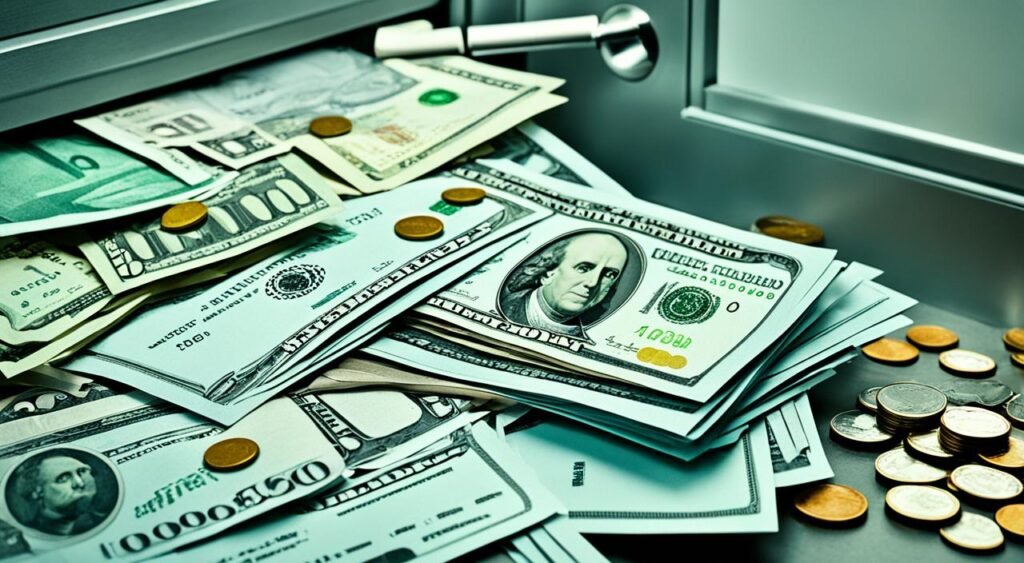
Looking for an unsecured personal loan? You’ve got lots of options. You can check out online lenders ,banks ,credit unions, and even peer-to-peer lending platforms. All these places offer different types of unsecured personal loans
Online Lenders
Getting an unsecured personal loan from an online lender is super easy. First, you fill out an loan application online. Then, you’ll quickly see what terms and rates you qualify for. They are known for fast service and good rates.
Banks and Credit Unions
Banks and credit unions are good options too. They might have lower interest rates than online places. Plus, you could get more help. But, applying and getting approved might take longer.
Peer-to-Peer Lending Platforms
If your credit isn’t perfect, try peer-to-peer lending platforms. They connect you with people who want to invest in loans. You might find more loan options there. Always, check what the rates and terms are.
No matter where you look, be sure to compare the loan’s details. Look at the rates, fees, and how long you have to pay it back. This will help you find the best unsecured personal loan for you.
Tips for Getting the Best Unsecured Personal Loan
Securing an unsecured personal loan wisely is key. Do your homework to find the best deal. With simple strategies, you can improve your chances of favorable terms and rates.
Shop Around and Compare Rates
Choosing the first offer is unwise. It’s vital to look around and compare what different lenders offer. This includes checking interest rates, fees, and how you’ll pay back the loan. Make sure the deal you choose fits your financial needs the best.
Also read: What Is A Loan Term?
Improve Your Credit Score
What lenders offer you depends a lot on your credit score. Check your credit report before you apply. Fix any mistakes you find. Also, try to pay off debt, pay your bills on time, and keep your credit card use low. This will make you look more attractive to lenders.
Consider a Co-Signer or Co-Borrower
If your credit or income isn’t strong enough on its own, think about getting help. Someone with better finances can co-sign or co-borrow with you. This might help you get a better deal. But know that this affects everyone legally responsible for the loan.
FAQs
Q: What is an unsecured personal loan?
A: An unsecured personal loan is a type of loan that does not require collateral to borrow money. It is based on the borrower’s creditworthiness and ability to repay the loan.
Q: How can I apply for an unsecured personal loan?
A: You can apply for an unsecured personal loan through a bank, credit union, or online lending platform by filling out an application and providing documentation of your income and credit history.
Q: What are the differences between secured and unsecured personal loans?
A: Secured personal loans require collateral to borrow money, while unsecured personal loans do not. Secured loans may have lower interest rates, but unsecured loans are less risky since they do not require collateral.
Q: What are some common loan options for unsecured personal loans?
A: Common loan options for unsecured personal loans include debt consolidation loans, medical loans, wedding loans, and home improvement loans.
Q: Can I use an unsecured personal loan for any purpose?
A: Yes, you can use an unsecured personal loan for various purposes such as paying for emergency expenses, home repairs, vacations, or any other personal financial need.
Q: How do I qualify for an unsecured personal loan?
A: To qualify for an unsecured personal loan, you typically need a good credit score, stable income, and a low debt-to-income ratio. Lenders will also consider your credit history and employment status.
Q: What are the advantages of choosing an unsecured personal loan?
A: Choosing an unsecured personal loan can offer fixed monthly payments, no risk of losing collateral, and the flexibility to use the loan for various purposes without restrictions.
Q: What are the potential impacts on my credit score when getting an unsecured personal loan?
A: Getting an unsecured personal loan can impact your credit score positively if you make timely payments and manage the loan responsibly. However, missing payments can negatively affect your credit score.
Q: How do fixed monthly payments work for unsecured personal loans?
A: Fixed monthly payments for unsecured personal loans mean that you will pay the same amount each month for the life of the loan. This makes budgeting and planning easier as you know exactly how much to pay each month.
